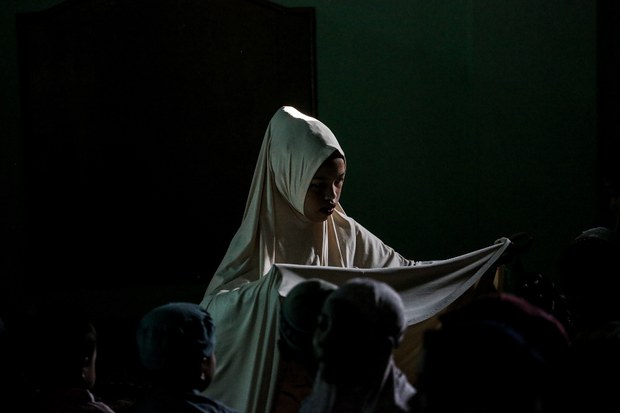Philippine Muslims Celebrate Eid-ul-Adha Under Tight Security
2019.08.11
Manila
 A Muslim Filipina prepares to offer prayers inside a small mosque during Eid-ul-Adha celebrations in Marikina, a city east of Manila, Aug. 11, 2019.
A Muslim Filipina prepares to offer prayers inside a small mosque during Eid-ul-Adha celebrations in Marikina, a city east of Manila, Aug. 11, 2019.
Updated at 3:23 p.m. ET on 2021-08-19
Muslims in the mainly Catholic Philippines celebrated the Eid ul-Adha holiday on Sunday amid tight security, with soldiers and police deployed in crowded areas nationwide to guard against a reported threat of terrorist attacks.
The Muslim festival known as the Feast of the Sacrifice, one of the two most important holidays on Islam’s calendar worldwide, coincided with an intelligence report that suspected militants allied with the Islamic State (IS) terror group were plotting a series of bombings in the northern Philippines.
Philippine intelligence officials had warned that Suyuful Khilafa Fi Luzon (SKFL), a little-known group whose members were previously allied with the Rajah Solaiman Movement (RSM), were believed to be planning attacks.
On Sunday, troops with high-powered firearms patrolled mosques and churches in Manila and in nearby provinces to thwart possible attacks.
“The report that has spread was meant for intelligence units to verify,” Col. Audrey Pasia, who commands the army’s 702 Infantry Battalion in the northern region, told Benar. “So far, we have no information regarding the threat but nevertheless – with or without a report – we are always doing our job in coordination with the PNP [Philippine National Police].”
The alert, he said, was part of “precautionary measures” ordered by the military command.
“The same thing is happening in other churches, even in Manila. Even at the MRT, there are K9 and EOD,” he said, referring to explosives-sniffing dogs and bomb-squads deployed to the metro rail system in the Philippine capital.
![190811-PH-church-guards-620-inside.jpeg Government security personnel guard an entrance to the Our Lady of Manaoag Church in Manaoag, Philippines Aug 11, 2019. [Jojo Rinoza/BenarNews]](/english/news/philippine/Muslims-Eid-08112019092107.html/190811-PH-church-guards-620-inside.jpeg/@@images/0fbd8d72-9807-4fd4-93c4-5a717e0a09d5.jpeg)
Meanwhile in Balo-i, a municipality near the battle-scarred city of Marawi in the Philippine south, a Muslim charity organization donated and butchered some 2,500 calves to celebrate the Islamic holiday.
Mehmet Riza Derindag, president of the Care Foundation of Turkey, said it had also donated calves, goats and sheep and lambs in other countries.
“It is significant for us to celebrate the Feast of the Sacrifice and remember the sacrifice of Prophet Abraham,” he told Benar. “The significance of Eid-ul-Adha is the story in the Quran and the Bible that we sacrifice animals instead of killing one another.”
![190811-PH-Muslim-women-620-inside.jpg Muslim women and girls gather outside a small mosque during Eid celebrations in Marikina, Philippines, Aug. 11, 2019. [Basilio Sepe/BenarNews]](/english/news/philippine/Muslims-Eid-08112019092107.html/190811-PH-Muslim-women-620-inside.jpg/@@images/5017ba09-69ff-4af2-a4ac-483bad89b906.jpeg)
Apart from the Philippines, Muslims were also celebrating Eid-ul-Adha on Sunday in neighboring Islamic-majority Indonesia and Malaysia, and elsewhere in Asia.
The Turkish foundation donated the livestock to evacuation centers near Marawi and surrounding areas, as well as other communities in the southern Philippines where Muslims form the religious majority.
More than 50,000 displaced residents of Marawi spent their Eid holiday in tents and temporary shelters.
The long awaited return to their homes in the ruined southern city has been plagued by unexpected problems. These range from unexploded ordnance and the reluctance of building owners to demolish their structures that were damaged during the 2017 battle of Marawi, when government forces fought for five months to rid the city of IS-linked militant who had taken it over.
“We are fed up with the government’s promises,” Aga Khan Sharief, a local Muslim leader, told BenarNews. “We will reconstruct our lives even without government help.”
![190811-PH-protest-church-620-inside.jpeg Muslims in the northern Philippine province of Pangasinan demonstrate in front of the Our Lady of Manaoag Church in Manaoag to denounce the Islamic State terror group, Aug. 11, 2019. [Jojo Rinoza/BenarNews]](/english/news/philippine/Muslims-Eid-08112019092107.html/190811-PH-protest-church-620-inside.jpeg/@@images/a0fe6d86-532a-40b8-8c26-34c25594cb12.jpeg)
Basilio Sepe, Jojo Rinoza, Richel V. Umel and Froilan Gallardo contributed to this report from Manila and Dagupan and Balo-i, Philippines.
This story has been updated to remove information about an intelligence report naming individual suspects that authorities subsequently dismissed as unfounded.







